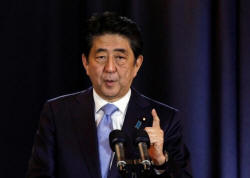|
 Japan
PM's advisers urge annual review of drug prices Japan
PM's advisers urge annual review of drug prices
 Send a link to a friend
Send a link to a friend
[December 07, 2016]
TOKYO (Reuters) - Prime Minister
Shinzo Abe's economic advisers, hoping to curb Japan's ballooning
healthcare costs, proposed on Wednesday reforms to the way drug prices
are set, a step opposed by foreign and domestic drug makers who say the
changes will stifle investment.
|
|
 The proposals follow a decision to halve the price of Bristol Myers
Squibb Co's cancer drug Opdivo last month, and an earlier move to
slash the price of Gilead Science Inc's highly effective but
expensive hepatitis C drug Sovaldi. The proposals follow a decision to halve the price of Bristol Myers
Squibb Co's cancer drug Opdivo last month, and an earlier move to
slash the price of Gilead Science Inc's highly effective but
expensive hepatitis C drug Sovaldi.
The four private-sector advisers at Abe's Council on Economic and
Fiscal Policy (CEFP) proposed reviewing all prescription drug
prices, which are set by the government, at least annually, rather
than once every two years as currently.
The advisers, including Sadayuki Sakakibara, head of Japan's biggest
business lobby Keidanren, went on to call for reviewing four times a
year official prices of the drugs that prove to be effective against
more diseases than initially identified and which experience an
unexpectedly high surge in sales.

Health Minister Yasuhisa Shiozaki put forward a similar proposal at
the panel's meeting on Wednesday.
Based on the private-sector advisers' proposals, Abe ordered Economy
Minister Nobuteru Ishihara and other cabinet ministers to map out
basic guidelines by the next panel meeting later this month.
Abe's advisers also called for reviewing prices on generic drugs
once a year or more, which would lead to lower official prices given
that market prices of medicines overall are on a steady decline.
Japanese and foreign drug makers argue that not only would the
changes stifle innovation by creating uncertainty over pricing but
would undercut a key component of Abe's economic growth policy,
which calls for attracting research and development investment from
pharmaceutical companies.
[to top of second column] |

"The current system of biennial repricing has served Japan and the
Japanese people well by ensuring the predictability of
reimbursement, controlling healthcare expenditures, rewarding
innovation and, most importantly, improving access for Japanese
patients to the most innovative treatments available globally," said
a joint statement by U.S. and European industry groups.
"Adopting annual repricing threatens to undo all of these
achievements," the statement said, echoing complaints by Japanese
drug makers.
(Reporting by Tetsushi Kajimoto and Linda Sieg; Editing by
Muralikumar Anantharaman)
[© 2016 Thomson Reuters. All rights
reserved.] Copyright 2016 Reuters. All rights reserved. This material may not be published,
broadcast, rewritten or redistributed.
 |